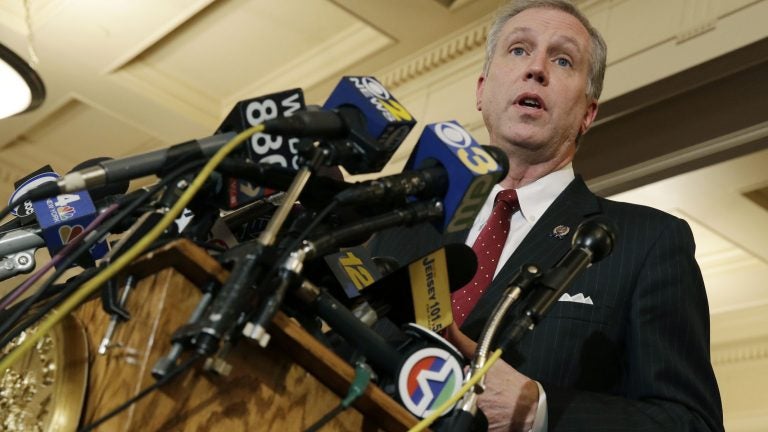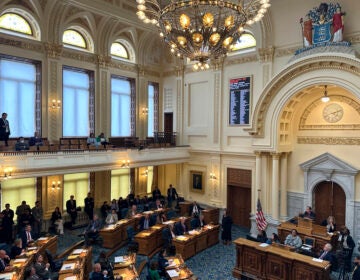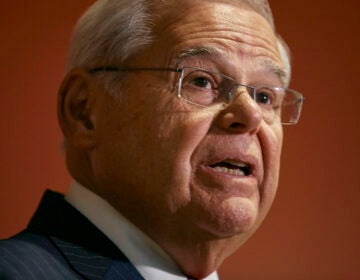Despite what you’ve heard New Jersey’s 2017 governor’s race is not over

New Jersey Assemblyman John S. Wisniewski
A second candidate has officially stepped into the ring for the Democratic nomination for governor — well, sort of.
Although he has been consistently touted as a possible contender for the nomination, Assemblyman John Wisniewski (D-Middlesex) is now doing more than just testing the waters. He filed paperwork this week setting up a committee to raise money for a campaign — technically making him a candidate for the office, at least in the eyes of the Election Law Enforcement Commission. Wisniewski has not formally announced his bid, saying he’s opted instead to wait until after the presidential election concludes next month.
“For election law reporting purposes, from a regulatory standpoint, the Election Law Enforcement Commission has a kind of all or nothing view about raising money for a gubernatorial campaign,” Wisniewski said. “And so while I’m calling it an exploratory committee, which I’m permitted to do, the rules that apply are as if you are running.”
Wisniewski’s announcement adds some life to a Democratic primary that by many measures and some accounts is over without having ever really begun. Phil Murphy, the former U.S. ambassador to Germany and Goldman Sachs executive, became the odds-on favorite in the race earlier this month, after securing the endorsements of several Democratic county chairmen in the northern and central parts of the state and most of party’s leadership in Trenton.
That roster of support — plus the former Goldman Sachs executive’s deep pockets — has deterred almost every other prospective competitor for the nomination, many of them high-profile Democrats who had spent years laying the groundwork for a campaign.
Wisniewski remains one of the last men standing of that group of potential Murphy challengers, which also might yet include State Investment Council Chairman and Princeton lawyer Tom Byrne. But unlike Byrne, who would likely occupy the centrist role opposite the more progressive Murphy in a statewide primary, Wisniewski seems to be fashioning himself as the progressive alternative.
A former New Jersey Democratic State Committee chairman and one of the Legislature’s more liberal lawmakers, Wisniewski became the only elected official in New Jersey to endorse Vermont Senator Bernie Sanders in his breakaway campaign for the Democratic presidential nomination earlier this year. He served as the Sanders campaign’s New Jersey state chairman, and has since hired a team of “veterans of Senator Bernie Sanders insurgent presidential campaign,” as he called them in an announcement earlier this month, to help run his committee, including the media firms Devine Mulvey Longabaugh and Revolution Messaging and the polling firm Tulchin Research.
Earlier this week, in an email officially announcing his exploratory committee and soliciting $3 dollar donations from supporters, Wisniewski argued “Wall Street bankers” and “special interests” were boxing out the needs of working people and families in government. The message could be construed as an apparent swipe at Murphy, who has been criticized as a moneyed outsider looking to buy his way into New Jersey public office.
“I believe that we need to seriously transform the way government works,” the email said. “Right now it’s working very well for big corporations, Wall Street, and special interests. We need to turn that around. Government is at its best — our state is at its best — when its goal is to help working families succeed.”
The strategy of modeling himself the progressive standard-bearer in a statewide gubernatorial race could be difficult, though, given the fact that Murphy — a former fundraiser for the Democratic National Committee —has himself made efforts to step into that role. Much of Murphy’s success, political observers say, has come from his ability to convince supporters of his commitment to liberal ideals and from proposing a policy platform that features some pretty progressive ideas; these include a call to end hedge fund investments in the state’s pension and benefits system, the creation of a public state bank, raising the minimum wage to $15, and full-scale legalization of marijuana.
“Everyone thinks that there’s this line of attack on Phil Murphy, that he’s a favorite of Wall Street and he’s a favorite of insiders,” said Matthew Hale, professor of political science at Seton Hall University. “But I think that’s more of a hope than a reality. I think he has shown he can respond to that effectively, with his talk of being ‘middle class on a good day’ and some of his policy positions.”
Wisniewski has led efforts for some liberal causes in the Legislature, calling earlier this year for an increase in the state’s minimum wage to $15, voting to fund Planned Parenthood last year, and lobbying for a 25-cent increase in the gas tax — 2 cents more than the hike included in a bill passed by the Legislature this month — to fund the depleted Transportation Trust Fund.
But his maverick position also seems to have hurt him politically in Trenton and elsewhere. After endorsing Sanders in the Democratic presidential primary, Wisniewski was stripped by party elders of his status as a delegate to the DNC, effective following this year’s July convention, and replaced with Hillary Clinton loyalist John Graham. The hasty backroom decision drew scrutiny from some observers, who saw it as retaliation against Wisniewski’s deviation from party agenda.
More recently, despite the fact he requested subpoena power in the Legislature’s new investigation into NJ Transit in his role as chairman of the Assembly Transportation Committee, Assembly Speaker Vincent Prieto ultimately chose to send that authority to the Assembly Judiciary Committee.
Prieto, it should be noted, in his role as Hudson County Democratic Chair, had thrown his support behind Murphy just days before the vote on the resolution regarding subpoena power. Asked about the issue, Wisniewski deferred to party leaders.
“I have reached out to the Speaker, but in our system of government, in our system of Legislature, the presiding officer gets to make all of those calls,” Wisniewski said. “Committee chairs are a lofty title, but committee chairs are only allowed to do that which the Speaker tells them to do.”
Another lofty title Wisniewski held but has failed to get back, despite efforts to do so, is his chairmanship of the Select Committee on Investigations, which disbanded last year after concluding its deep dive into the closing of commuter lanes at the George Washington Bridge in 2013. The committee helped uncover many of the central angles that prosecutors are now pursuing in the federal Bridgegate trial, but also helped propel Wisniewski onto the national stage, with a reputation as a savvy politician bent on agitating against the Republican administration of Gov. Chris Christie.
Along with the committee’s co-chair and state Sen. Loretta Weinberg (D-Bergen), who happens to support Murphy, Wisniewski has petitioned for the committee to be reconvened in the wake of new details brought to light in the Bridgegate trial. Such a re-authorization would be “appropriate, it would be right, it would be standing up to the prerogative of the Legislature to allow that committee to continue its work,” he said.
“At a minimum, we now have a whole body of information about what the governor knew, and when he knew it, and that’s important for the legislative investigation not because we’re a criminal enforcement agency — that’s Mr. Fishman’s job — but because all along we’ve said we need to understand how this abuse of power happened, so that we can practically legislate against it happening again. We have not finished that job,” he added.
“To have that committee reconvened, it would take a vote of the Legislature in both houses, and certainly that’s doable. But again, that’s a decision that the presiding officers make,” he said. “I could put in a resolution tomorrow, as could Senator Weinberg, but the decision ultimately rests with the Speaker and the senate president. I have made my views known. In light of the trial in federal court, it is clear a number of the people who provided testimony to the Legislature did not testify in the same fashion that they did in federal court.”
Wisniewski is not the only candidate hoping to wear the progressive banner in 2017. Besides Murphy, New Jersey Democrat Lisa McCormick has also been soliciting donations toward a statewide campaign, and she looks to be making efforts to appeal to Sanders voters. In an email blast this week, McCormick, who has not yet filed with ELEC, said she needed “10,000 donations of $43 (or 1,000 of $430) to qualify for public financing, which would match every dollar contributed with $2.”
The email reads: “The establishment does not care about us, and it is time to fix that. From Occupy Wall Street to Bernie’s revolution, Americans are ready for big changes … We will not be saved by a greedy Wall Street millionaire.” It added, “We can make government a powerful force for good if we reclaim democracy — which means ‘people power’ —to attain fair taxes, good jobs, universal health care, free ‘pre-K to college’ public education, effective environmental laws & more.”
McCormick is a leading member of Democrats For Change, a volunteer organization that has been recruiting candidates for down-ballot races across the state. She ran for Rahway City Council in 2014, and Union County Clerk in 2010. James Devine, also of Democrats for Change, said McCormick is “one of many people who wants to see a viable alternative to Phil Murphy.”
Hale added that while an outside candidate could theoretically tap into Sanders’ base in New Jersey, that might not be Wisniewski, given his service in Trenton.
“That’s part of Murphy’s appeal, he’s the outside politics guy,” Hale said. “I don’t think you could say you’re the change agent and be in the New Jersey Legislature.”
Wisniewski, for his part, said his campaign is not about labels and that “people deserve to have a robust discussion about who is going to be the Democratic standard-bearer.”
“It’s not about a type of candidacy, it’s not about a set of talking points. It’s about what the electorate is looking for,” he said. “They’re looking for a candidate that represents them, that understands their daily struggles and what matters to them in terms of their families and their futures. So when I go around the state talking to people about what’s important to them, if you really want to boil it down, they want a candidate who’s going to represent the issues that are important to Main Street, the issues that are important around the kitchen table.
____________________________________________________________
NJ Spotlight, an independent online news service on issues critical to New Jersey, makes its in-depth reporting available to NewsWorks.
WHYY is your source for fact-based, in-depth journalism and information. As a nonprofit organization, we rely on financial support from readers like you. Please give today.




